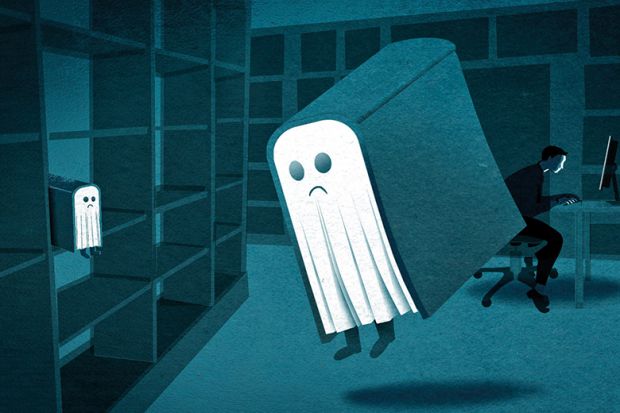Academics in the liberal arts face many personal and professional anxieties, but there is one deep concern that underlies them all: the demise of the book.
Opening the pages of a library book was for centuries a source of unalloyed intellectual, spiritual and social pleasure for all academics. That experience was a treasure we shared with our students, colleagues, friends and families, creating indelible memories and transforming lives. But it is an experience that has increasingly been marginalised and even dismissed.
When we were growing up, we viewed books as our friends and as symbols and instruments of the promises and possibilities of our democracy. Coming from ethnic working-class areas of the industrial city of Cleveland, we lugged volumes back and forth to the Roman Catholic high schools we attended. We read them in study halls, on buses, in our bedrooms and basements, in local public libraries and moving libraries called bookmobiles. The more than 2,500 Carnegie Foundation libraries built in towns and cities across the US between 1883 and 1929 gave people like us access to books that we could not afford to buy, while the mass production of cheap paperbacks allowed us to build our own personal libraries. All this provided a level playing field that even the cheapest laptops, mobile devices and internet services cannot duplicate.
But it is not nostalgia that makes us uneasy. Books are endangered. They are being disappeared and destroyed at educational institutions of all levels, but arguably most barbarously at large state universities, where capacious libraries were once designed to serve students and all citizens of their states.
At the University of Texas at Austin, the undergraduate library was built in 1963 for $38 million in 2018 dollars (£27 million). Within 20 years it housed 157,000 books, and its holdings kept on growing until 2005, when the library was cleared and rebranded as an “academic centre”, complete with 250 computers and a café. About 90,000 books were transferred elsewhere; the fate of the rest can only be imagined.
Books are arguably the crucial factor in the achievements of Western and eventually world civilisation over the past 600 years. They have survived being banned and burned by oppressive regimes. Shrewd plantation owners forbade young black slaves from teaching themselves to read, but slaves like Frederick Douglass read books secretly in “largely surreptitious self-education”. Yet now books are disappeared at universities of all places by upper administrative fiat.
Johannes Gutenberg’s invention of movable type in 1439 made the production of books faster and cheaper, enabling more people to buy and read them. Increasing literacy created more readers and authors – and more books. Once chained in monasteries, books were now liberated. Great universities and cities produced great lending libraries. Canadian philosopher Marshall McLuhan’s metaphor of the “Gutenberg galaxy”, coined in 1962, is dazzlingly appropriate.
However, the Gutenberg galaxy is now rapidly contracting. Managers of university and public libraries have been busy “deaccessioning” scholarly books, periodicals, journals and monographs. In the past two years, UT Austin’s senior administrators – almost all non-humanists – have unilaterally moved far along in “remote-storing” and “deduplicating” the historically and educationally priceless holdings of our Fine Arts Library, which was previously a jewel in our institution’s crown of humanistic research resources. In phase one of the project, 55,000 books and 20,000 journals were removed; 85,000 more are targeted.
Unless the university authorities bow to faculty, public and alumni protests and suddenly reverse course, they will eradicate what the Fine Arts graduate faculty calls “the equivalent of an up-to-date laboratory in the sciences”. The newspeak provisions of the “Joint Library Facility” recently created for the two major public university systems in Texas make clear that, in at least some cases, “deaccessioning” and “deduplicating” holdings are indeed euphemisms not only for removing books from accessible collections but for destroying them. At Texas A&M, for cost reasons, “disposal (shredding and recycling) by an outside vendor is preferred”.
Worse still, because state universities are now run on the corporate model, senior administrators do not consult the faculties of the colleges affected before dismantling specialist libraries. For purposes of space allocation, libraries are lumped together with scientific laboratories and administrative offices and deemed outside the purview of faculty. Administrators favour “reimagining” existing spaces and library directors want to be part of the historic shift to digitised information; our college of library science has rebranded itself the School of Information.
Yet even if the production of hard copy books goes the way of vinyl recordings, extant library books retain inestimable value. They are historical artefacts. Consecutive editions over time speak to the evolution of ideas. Much-used library copies make us aware that books are part of our long-shared cultural experience. For scholars of the early modern period, watermarks on pages yield important information about publication; who knows what physical properties future scholars will want to study? They won’t be able to study books that no longer exist.
Individual physical volumes invite us to spend time alone with them, off-line, without distracting pop-ups and sidebars, and without the shadow of Big Brother: with just their contents and our own thoughts. Those who are responsible for the impending implosion of the Gutenberg galaxy have not reflected on the black hole it will create. The galaxy of books should not die with a whimper, nor with a bang. It should not die at all.
It would be great to have the legendary ancient library of Alexandria digitised, but even better would be to retrieve its books from the flames.
Al Martinich and Tom Palaima are professors of philosophy and Classics respectively at the University of Texas at Austin.
后记
Print headline: Prints charming




